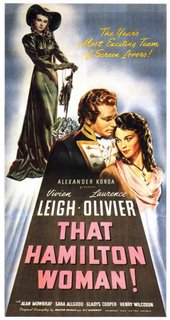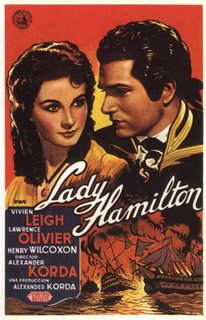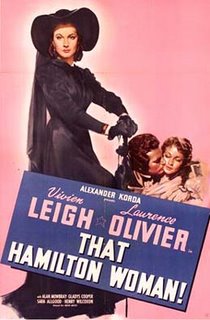------------------------------------------------------

Napoleon can never be master of the world until he has smashed us up—and believe me, gentlemen, he means to be master of the world. You cannot make peace with dictators, you have to destroy them.
Monday marks the 65th Anniversary of the premiere of That Hamilton Woman. It was, by all accounts, Winston Churchill's favorite movie. If the stories are to be believed, in addition to suggesting its subject to producer-director Alexander Korda, Churchill also wrote the speech (quoted above) that the film's hero, Lord Horatio Nelson, makes to the Lords of the Admiralty after the ratification of the Peace of Amiens in 1802.

That Hamilton Woman is, first and least, propaganda. It was the first non-Soviet movie to get general distribution in the Soviet Union. Alexander Korda was subpoenaed to appear before the United States Senate Committee on Foreign Relations, chaired by Gerald P. Nye because, in addition to producing and directing the industry movie that the isolationist Senator Nye came to focus on (he'd gained prominence by, among other things, repeatedly accusing Hollywood of peddling pro-war propaganda), Korda was providing cover to British intelligence operations within the United States. The date set for his appearance was December 12, 1941.
That's the way people look at these things. They do not believe in a friendship between a man and a woman.
Do you?
I think two things make That Hamilton Woman a movie worth seeking out. The first is its production history. It was shot in just six weeks at what are now known as the Hollywood Center Studios (imdb.com has this wrong). It was being written as it was being filmed. Korda had to film a scene (which he later removed) to get the censors to approve the finished movie for distribution. There is a story that on day one of shooting there was a delay while the cast and crew tried to find out which arm and eye Nelson had lost. While filming was going on the lead actor was preparing to return to England to join the war effort by learning to fly. Much like Casablanca, but on a more limited budget, out of chaos came, despite a few flaws mostly having to do with the scenes at sea, a classic.

The second and foremost thing that makes it worth seeking out is the actress who plays that Hamilton woman. Earlier in the same year in which the movie was shot, she won an Academy Award for playing Scarlett O'Hara in Gone With The Wind, appeared in Waterloo Bridge and 21 Days, and married her co-star. Vivien Leigh would appear in only six more movies during the next 27 years and in none of these would she again work with her new husband, Laurence Olivier. Her work here is even more accomplished than it is in her Academy Award-winning performances. While she and Olivier are well-matched as one of the more famous unmarried couples in history, it is she who is the movie star working at the top of her game while he is a talented actor creating a character. While he was creating Nelson he was also in the early stages of developing the movie (Henry V) that would make him a great movie actor-director, provide a morale-boost for an England still at war four years later and prove that Shakespeare's plays could be successfully adapted for the screen.
There is no then. There is no after.
There is apparently a new DVD version of That Hamilton Woman available in England though in a quick search I couldn't find it for sale by a reputable internet retailer. Netflix lists it and you can put it in your queue, but there is, as yet, no release date. My library has the Samuel Goldwyn Classic Collection video version in its catalogue. See it if you can find it and keep it in mind if you can't--because when it comes to That Hamilton Woman, there is still a then and there is still an after, 65 years after its premiere on April 3, 1941 at Radio City Music Hall in New York City in the United States of America.
Loner,
ReplyDeleteAn excellent review. Do you know why Vivien Leigh made so few films after '41?
The idea of Churchill working on a screen play for a film with at least some propaganda intent is very entertaining. As is Hollywood's enthusiasm - once Uncle Joe was on the hot seat.
PS - Are you following Groucho's dictum regarding not joining any clubs which would have you as a member? And thanks for your long listing of favorites - I've copied it for sifting.
David,
ReplyDeleteThanks for the vote of confidence, but this is Loner's review, not mine. I'm just the conduit.
I love Vivien Leigh and I think the character of Nelson is one of the most romantic and charismatic in military history. Talk about a guy being in the right place at the right time.
ReplyDelete"Talk about a guy being in the right place at the right time."
ReplyDeleteExcept maybe for those last few minutes at Trafalgar...
Rick,
ReplyDeleteThanks and you are welcome.
Vivien Leigh was manic-depressive (and getting worse) in 1941, she was diagnosed with tuberculosis in 1944 and she miscarried twice. She had a breakdown while making Elephant Walk in 1953. She still managed to make the occaisional movie, including A Streetcar Named Desire, and to play, often oppposite Olivier, in theaters right up to her death, from tuberculosis, in 1967.
Of the mental problems Olivier would write: "Throughout her possession by that uncannily evil monster, manic depression, with its deadly ever-tightening spirals, she retained her own individual canniness—an ability to disguise her true mental condition from almost all except me, for whom she could hardly be expected to take the trouble."
As to Groucho's dictum, the answer is an emphatic yes.
David,
I took the time to read many of your Amazon reviews last August. Good work. I hope you enjoy That Hamilton Woman.